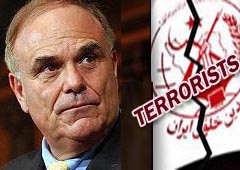Give Ed Rendell a break.

Yes, the Treasury Department is investigating the speaking fees received by the former Pennsylvania governor on behalf of an Iranian exile group that’s on the State Department’s list of foreign terrorist organizations. Rendell told the New York Times he had received about $150,000 for seven or eight speeches that called for taking the Mujahedin-e Khalq, or MEK, off the list (even though he clearly knew little about the  organization).
organization).
But why is Treasury targeting only Rendell? There’s an astonishing list of high-level former officials – from both parties – who’ve embraced the MEK cause, for which they’ve collected big bucks, along with trips to pro-MEK conferences in Brussels, London, Berlin, and Paris.
And why have so many prominent men linked their names to an outfit with such a shady, and cultish, reputation – a group that has killed Americans and done dirty work for Saddam Hussein?
The MEK is lobbying hard for the State Department to take it off the terrorist list. (A decision is supposed to be made by the end of March.) It has won support, on the Democratic side, from former Vermont Gov. Howard Dean, former U.S. Sen. Robert Torricelli, and retired Gen. James Jones, President Obama’s first national security adviser. And of course, Rendell.
As for Republicans, boosters include former CIA Directors James Woolsey (a big backer of the Iraq war) and Porter J. Goss; former FBI Director Louis Freeh; former Attorney General Michael Mukasey; former New York Mayor Rudolph Giuliani; and President George W. Bush’s first homeland security chief, former Pennsylvania Gov. Tom Ridge. Never mind that Bush renewed the MEK’s terrorist designation four times.
Add to the list a number of retired generals, along with John Bolton, foreign-policy adviser to Newt Gingrich, and Mitchell Reiss, who advises Mitt Romney.
What were they all thinking?
Maybe it was the money. Or perhaps they were conned by an incredible MEK lobbying effort carried out through a series of front groups. That effort lavished money on prime-time TV, and full-page newspaper ads, which portray the MEK as a democratic group leading the fight for Iran regime change.
Apparently none of these pooh-bahs ever asked about the source of their honoraria. "Nobody has ever been able to figure out where the money comes from," says Iran expert Barbara Slavin, the Washington correspondent for al-Monitor.com, a new website on the Mideast. Rumors abound that funds come from Gulf countries opposed to Iran, or from Israel, which reportedly has close contacts with the MEK, or from Iranian exiles.
Nor do MEK boosters appear to have researched the group’s violent history, which should have been well-known to many of them.
The group began as a Marxist-Islamist group supporting Ayatollah Ruhollah Khomenei; it killed six Americans in the 1970s. In the 1980s, having broken with the Tehran regime, it sought refuge in Saddam Hussein’s Iraq. The Iraqi leader used MEK forces to attack Iran in a brutal war that lasted a decade, and to kill rebellious Kurds and Shiites.
For that reason, the MEK is despised inside Iraq, where U.S. officials are trying to resettle 2,800 remaining MEK fighters. The Iraqis want to evict them from their base at Camp Ashraf.
More critically, the group is also despised inside Iran. "In the eyes of the Iranians, they embedded with the enemy. They were traitors," says Iran expert Vali Nasr. They are regarded likewise across the Iranian political spectrum. The idea that the group has vast support inside Iran is simply untrue.
When Ridge labeled the MEK the "most effective opposition movement" of the Iranian people, he was talking nonsense, a sad commentary on what he didn’t learn as homeland security chief. Moreover, the MEK reportedly operates like a cult, forcing members into celibacy and exacting total obedience to the MEK’s leader, the Paris-based Maryam Rajavi.
All that may not matter to some MEK boosters, like Giuliani. He recently declared on Fox News that the MEK should be named Time Magazine "person of the year." His reason: According to an NBC-News report, the group was trained by Israel’s Mossad to assassinate Iranian nuclear scientists. The MEK was also reportedly used by Israel to leak intelligence about a secret Iranian nuclear facility.
What Giuliani and other advocates ignore is that – whatever the MEK’s role in covert activities – the group does not have the support of the Iranian people. Delisting it may permit it to lobby more openly for support from gullible backers. It may help those who are seeking an exile group to tout as the vehicle for Iran regime change. (Does no one remember the saga of the Pentagon’s favorite Iraqi exile, Ahmed Chalabi?)
But delisting the MEK won’t help pro-democracy forces in Tehran. Nor will it help curb Iran’s nuclear program.
Ed Rendell should have known better than to support this group of exiles. But so should a lot of former U.S. officials with far less excuse for being so blind.
Trudy Rubin, Philly.com

